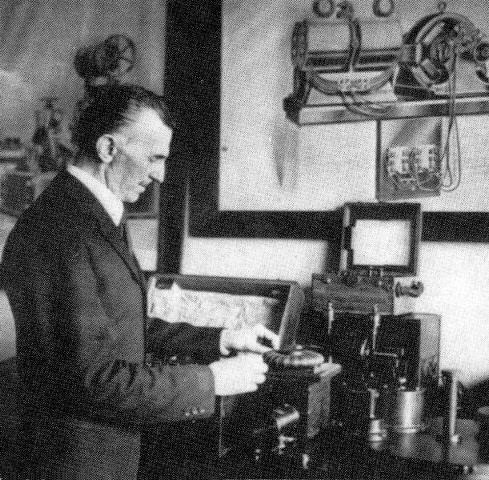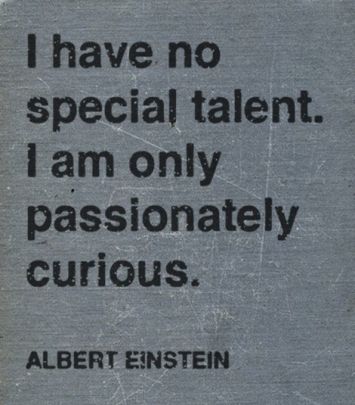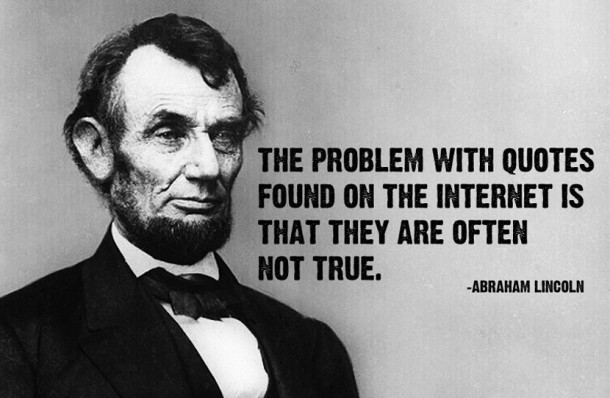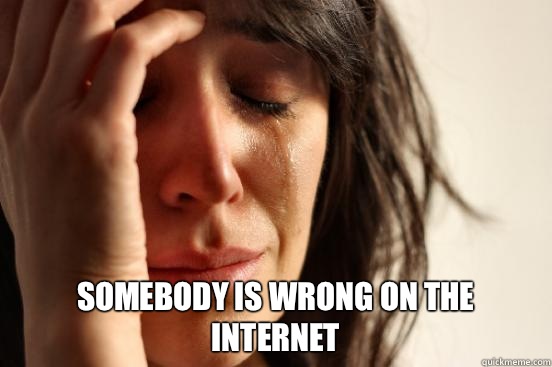Has curiosity been killed by smartphones?
This week in my Master's class "Creative Inquiry" the topic of curiosity was our primary concern, and something I saw turn up time and time again was that "Smartphones are destroying curiosity".
Now I consider myself a curious person, and after being distracted by reading about Nikola Telsa's history with X-Rays (ok, shortly after talking about smartphones the speaker mentioned the famous inventor and I couldn't help myself) I stopped and thought about this. First of all, I had committed what he was describing as a cardinal sin of curiosity, on encountering information I didn't know I had instantly pulled up google and started to research, but is this so bad?

This made me pause especially, because if this is bad, I am incredibly guilty of it in almost all sense.
After a quick break to puzzle together my thinking, my first thought was that it all comes back to what you use your smartphone or the internet for. Answering problems that you could pull up from past experience or from just working out yourself is quite frankly not the best use of it (and feels quite lazy). But that's not the only purpose for the infinite information available at your finger tips, not even by half.
After some personal reflection I had an idea of how I feel my personal use of my smartphone drives my curiosity. That is not to say that this is the same for every user, but I can only reflect from my own perspective.
Before I dive into talking about how smartphones can, in fact, help to drive curiosity I would like to first define exactly what I mean by curiosity. Of all the various definitions I have found during research into this topic my favourite is by Cicero (1883) which states "innate love of learning and of knowledge... without the lure of any profit". For me this works incredibly well as it separates the issue of profit from curiosity, as there are many times in my day to day job where I have worked hard to find better ways to do things, but I do not consider this curiosity but rather finding creative solutions to problems.
Curiosity is more like picking up a seed pod from the ground because it sparks your interest, looking at the sail like appendage that grows from the side of it and being attempting to work out exactly why it has grown that way, and what benefit it gives. It's looking at the behaviour of animals and attempting to deduce why. It's staring at the ground beneath a large dense tree and being interested in why the grass there is not as thick, assessing the knowledge you have already in your head and figuring out that it's to do with the level of sunlight that can penetrate it.
These examples feel very childlike in their descriptions, and these are thoughts I constantly have (suddenly I'm interested to see if there is a link between curiosity and childlike behaviour, but I will strive to put off this new avenue of research until I after I finish this blog). I'm sure from the overly poetic direction that last paragraph took you can tell that I value curiosity in myself, I feel that it is a vital part of my personality and something I treasure dearly, and it drives a lot of what I chose to do. The original direction for my life's career was in web simply because it was a new and exciting technology, and I stuck with it because it changes greatly every year, re-invigorating my love. Outside of my professional life, I also find myself reading Sci-Fi and Fantasy more than any other genre because both are obsessed with new, unknown worlds.
Quite simply I could spend days investigating new avenues of knowledge, new worlds and new ideas simply from the joy I get from the act of learning and discovering.
Perhaps one day men will no longer be interested in the unknown, no longer tantalized by mystery. This is possible, but when man loses his curiosity one feels he will have lost most of the other things that make him human. (Clarke, 1985)
But that's enough about me and my relationship with curiosity, let's instead talk about my thoughts on the interaction between it and my smartphone.
Spiking curiosity
Often, I will see a name or an idea appear in conversation and I will have no idea who or what that is. My first instinct is to either ask for more information or to bring up a quick google search on the topic, often to understand that topic a little more and place its relevance in the conversation. Honestly, this is just politeness in engaging with the person I communicate with, but often I will end up looking into this a lot more after the conversation is over.
This can come from the smallest of interactions, my previous example is a perfect one here. The speaker in the video (a link to the video here if you are interested, it was an enjoyable watch) simply mentioned that Nikola Tesla had done some work in X-Rays, and my first instinct was surprise. My family has a history with X-Rays and I thought that this was the kind of information that I would have already known. Within 10 minutes I had read up on how it seems he discovered them before Wilhem Rontgen, and how the two had communicated about the discovery quite happily. Also, I discovered that Nikola had an infinitely better name for images produced using X-Rays (Shadowgraphs). This is information I would have never discovered or cared to discover if I hadn't had that initial spark of inquiry and the ease of having a smartphone nearby to start the research. Loewenstein (1994) talks about how no one can be curious without a small amount of information on the topic, and I feel that this initial google search works towards that goal.
I can also attest that this instinct to consider everything I am even vaguely interested in does change day to day interactions. A year ago, I found some moss in a crack in the footpath with a sunbeam falling across it just right, and after looking at it with interest I spent the rest of the day looking into the lifecycle of moss and how to build a terrarium that supports its growth. Yesterday, during a long-distance class with a student in Melbourne, I overheard her roommate asking about the layering of moss in a small bottle she was putting together for jewellery. In an attempt to be helpful, I piped up with the information I learnt last year and both of them seemed shocked that such random knowledge sat within my domain. They both questioned me for a while on why I knew that information, and all I could answer with was that at one point I had been curious, so I had done some research.

Another quick example of this has been plaguing me the last few days. I recently re-invigorated my interest in playing Pokémon Go, a game which has been very vague about a handful of mechanics that are used every day by players of the game. In particular things like the spawning rate and location of Pokémon is still not a known factor, with large communities of players banding together to share information in an attempt to learn why it works the way it does to better understand the game as a whole. I spent an hour or two yesterday considering this research, but unsatisfied with the results I could find I spent an hour walking along Oxley creek this afternoon. While combing data online I had found a consistent spawn rate off the beaten path that no one else had seemed to notice, so I was interested in plotting the location and frequency of spawns in order to see if there was a pattern. Although I didn't come up with a definite answer I understand the system a little better, something I would have never investigated if I didn't have that prompt.
When people are wrong
A big issue with searching for information is of course that it is often wrong, something which just cannot be helped with the amount of information shared by people who don't have the full data. But honestly, having grown up with it, this is something that I am completely used to dealing with.

But this is only an issue when you take data at face value. In my previous example with Pokémon Go the data that I had encountered did not exactly match what I had experienced myself, so instead of taking it at face value I went out and did some experimenting myself. My intentions are not to go back and tell these people "AHA, you are wrong and I can prove it now", but simply that I found the answers intensely interesting and wanted to discover it for myself.

In fact, the knowledge that people can and often are wrong on the internet drives my curiosity further, since I can never just assume the data that I find is correct. Instead I have look into the history of the topic at hand, find sources that can be trusted and correlate the data. In a way, that extra need to verify data gives me much more satisfaction in my searches.
Places where smartphones cannot go
One thing that I think is important to stress here is that there is plenty of information that cannot be simply googled. The last year of my life has seen a lot of introspection on my own behalf into relationships and sexuality. This is the kind of information that dwells more within interactions with others, and within myself and while being curious about it and looking into it has indeed changed the way my life works, I could have never googled this. But even in this case there are things that existed within my phone's reach that helped me to discover the answer, primarily in the form of books or other's experiences. Having a copy of The Ethical Slut by Dossie Easton and Janet Hardy on my phone in epub form allowed me to get some perspective that when layered on my current relationships and life experienced helped me to be more curious about what direction I wanted my life to take.
I know my curiosity is not perfect, I have a habit of judging information as I am still accessing it instead of absorbing it all before making a decision. I also know that this description of how my curiosity and smartphone co-exist is only based on my own personal experience, and doesn't speak for everyone. But the high powered device sitting in my bag at all times is a wonder that has increased my knowledge about so many topics so quickly, and I truly feel that without it I could never find satisfaction in my curiosity, and would therefore dismiss it.
References
Cicero, Marcus Tullius. (1883). De finibus bonorum et malorum libri quinque. Cambridge, :University Press,
Clarke, A. (1985). The Promise of Space. Berkley Publishing Group.
Loewenstein, G. (1994). The psychology of curiosity: A review and reinterpretation. Psychological Bulletin, 116(1), 75–98. https://doi.org/10.1037//0033-2909.116.1.75
Wire, C. (2017). Curiosity fuel creativity: Chris Wire at TEDxDayton. YouTube. Retrieved 20 July 2017, from https://www.youtube.com/watch?v=fw3aynVqWs4